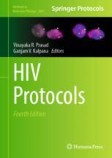Search
Search Results
-
Regulatory T Cells for Control of Autoimmunity
Regulatory T (Treg) cells, which specifically express the master transcription factor FoxP3, are indispensable for the maintenance of immunological...
-
In situ analysis of CCR8+ regulatory T cells in lung cancer: suppression of GzmB+ CD8+ T cells and prognostic marker implications
BackgroundCCR8-expressing regulatory T cells (Tregs) are selectively localized within tumors and have gained attention as potent suppressors of...

-
Evaluation of the Suppressive Capacity of Regulatory T Cells in Food Allergy Research
Regulatory T cells (Treg) exert a crucial role in the suppression of exacerbated T helper (Th) cell responses, including those of type 2 Th (Th2)...
-
Cellular Therapies for Cancer: Chimeric Antigen Receptor T Cells (CAR-T)
Chimeric antigen receptor T cell (CAR-T), a novel modality of adoptive cellular therapy, is characterized by the expression of chimeric antigen...
-
Generation of Anti-HIV CAR-T Cells for Preclinical Research
The inability of people living with HIV (PLWH) to eradicate human immunodeficiency virus (HIV) infection is due in part to the inadequate...
-
The construction of modular universal chimeric antigen receptor T (MU-CAR-T) cells by covalent linkage of allogeneic T cells and various antibody fragments
BackgroundChimeric antigen receptor-T (CAR-T) cells therapy is one of the novel immunotherapeutic approaches with significant clinical success....

-
Posttranscriptional Events Orchestrate Immune Homeostasis of CD8+ T Cells
Maintaining immune homeostasis is instrumental for host health. Immune cells, such as T cells, are instrumental for the eradication of pathogenic...
-
Attenuation of OX40 signaling suppression by age disrupts peripheral deletion of CD4+ T cells specific for the epidermal autoantigen desmoglein 3
Various autoimmune responses increase with age, but the underlying mechanism is not clear. In this study, we used CD4 + T cells expressing a...

-
Selective IL-27 production by intestinal regulatory T cells permits gut-specific regulation of TH17 cell immunity
Regulatory T cells (T reg cells) are instrumental in establishing immunological tolerance. However, the precise effector mechanisms by which T reg ...

-
Redirecting Human Conventional and Regulatory T Cells Using Chimeric Antigen Receptors
The adaptive immune system exhibits exquisite specificity and memory and is involved in virtually every process in the human body. Redirecting...
-
The regulation and differentiation of regulatory T cells and their dysfunction in autoimmune diseases
The discovery of FOXP3 + regulatory T (T reg ) cells as a distinct cell lineage with a central role in regulating immune responses provided a deeper...

-
Role of Regulatory T Cells in Intracerebral Hemorrhage
Intracerebral hemorrhage (ICH) is a common cerebrovascular disease that can lead to severe neurological dysfunction in surviving patients, resulting...

-
TIGIT is the central player in T-cell suppression associated with CAR T-cell relapse in mantle cell lymphoma
BackgroundChimeric antigen receptor (CAR) T-cell therapy using brexucabtagene autoleucel (BA) induces remission in many patients with mantle cell...

-
Brain regulatory T cells
The brain, long thought to be isolated from the peripheral immune system, is increasingly recognized to be integrated into a systemic immunological...

-
Nature Killer T (NKT) Cells in Cancer
By identifying foreign antigens expressed on the surface of tumor cells, the immunological system contributes significantly to limiting the...
-
Double-negative T cells ameliorate psoriasis by selectively inhibiting IL-17A-producing γδlow T cells
BackgroundPsoriasis is a chronic immune-mediated skin condition. Although biologic treatments are effective in controlling psoriasis, some patients...

-
The Role of Gamma Delta T Cells in Cancer
γδ T cells are a group of T lymphocytes known as nonconventional T cells. They are able to interact with a diverse range of antigens independent from...
-
Electrolyte imbalance causes suppression of NK and T cell effector function in malignant ascites
BackgroundMalignant ascites commonly occurs in advanced or recurrent stages of epithelial ovarian cancer during peritoneal carcinomatosis and is...

-
Hypoxia drives CD39-dependent suppressor function in exhausted T cells to limit antitumor immunity
CD8 + T cells are critical for elimination of cancer cells. Factors within the tumor microenvironment (TME) can drive these cells to a hypofunctional...

-
CD200Rhigh neutrophils with dysfunctional autophagy establish systemic immunosuppression by increasing regulatory T cells
Distinct neutrophil populations arise during certain pathological conditions. The generation of dysfunctional neutrophils during sepsis and their...

